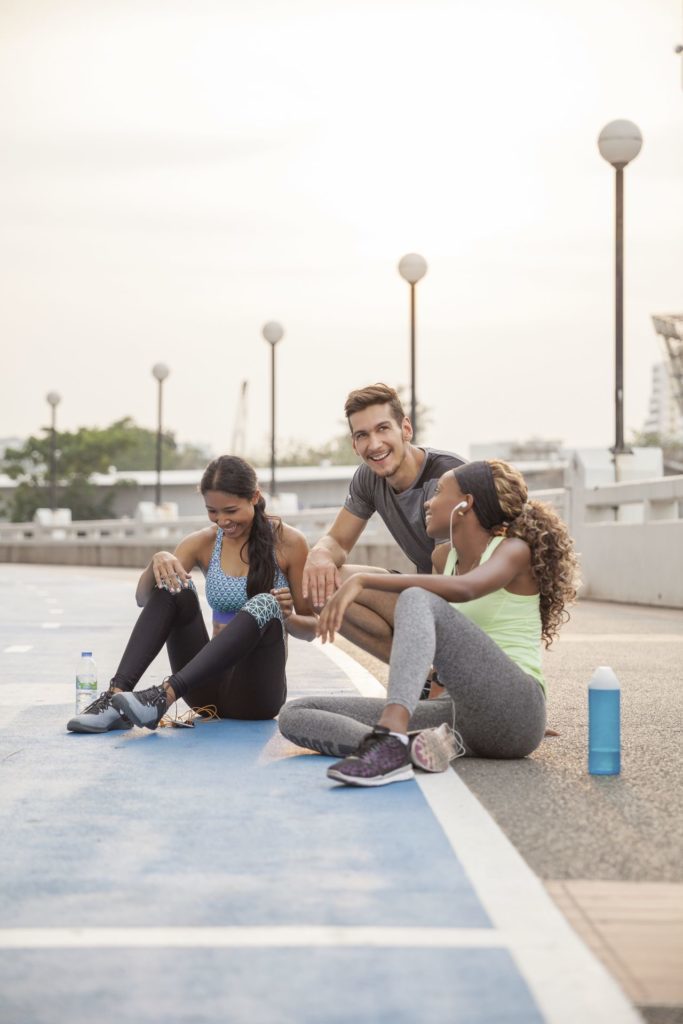6 Health Fails To Avoid This Summer

As Britons head outdoors to enjoy warmer weather, injuries are set to “sore” as new research from Bupa Health Clinics revealed that over three quarters of us – 40 million adults – have sustained a seasonal injury as a result of spending more time outdoors during the summer months. Outside of sun damage, allergies, stings and bites, the other common health problems that Britons face during the warm season are sprains, broken bones and muscle and ligament tears.
To help Britons enjoy this summer pain free, Dr Luke Powles, Lead GP from Bupa Health Clinics offers his expert advice on how to avoid those common summer health fails.
1 Play nicely
Research found that almost a fifth of summer injuries have been caused while playing garden games with friends and family, and two million adults said being too competitive in a game of summer sport has caused injury in the past. Britons are known for their competitive nature but in a friendly game of sport this could result in an injury.
TIP: Don’t overdo it
To avoid limping away with a sprain, or worse a broken bone, know your limits when playing games with friends and family – it is OK to take a breather now and again! Always make sure you are wearing the correct gear for the sport you’re playing. Helmets and shin pads etc are necessary with some sporting activities so don’t think you’ll be safe just because you’re in a back garden and not a professional pitch!
2 Be inspired, but be careful
As Briton’s look forward to the World Cup and Wimbledon this summer, a fifth of Britons will feel inspired to get outdoors and have a game themselves. But this could be dangerous if you’ve not played in a while. Using muscles that you’ve never trained before, or not used in some time, could lead to stiff, painful muscles in the days following the activity.
TIP: Take it easy
Go at a pace that suits you and your body. It’s important to remember that our bodies change over time when it comes to exercise. If you are watching these two major sporting events and feel inspired, be cautious about getting straight into strenuous exercise without warming up. Have a quick jog around and stretch your calves, hamstrings, back and arms. This can take no less than three minutes to do a full body stretch – so why not! Equally, if you take advantage of the warmer, light evenings and decide to pick up running over the summer, take ten minutes to introduce strength and conditioning training – this will help in the long term.
Prior to starting a new fitness regime or sport, see a physiotherapist or have a full body health assessment to ensure your body is at the right level before progressing and possibly causing injury. Getting a snapshot of your health is a great way to stay on track with fitness, especially when taking up a new activity. A physiotherapist will advise a training regime to match the new sport or activity you have begun which will minimise muscles tears or pulls.
3 Unwanted bites
Mosquitos look for CO2 as their food source which can be bad news for us after we exercise, drink alcohol or eat spicy food as we release CO2.
TIP: Be unappealing
To avoid being nature’s feast, make sure you cover up after a workout or if you’re enjoying some food in a pub garden. If you are bitten, act straight away and avoid itching by buying a cream from the pharmacy. Antibiotics are sometimes necessary if the bite gets infected. It’s important to monitor any changes surrounding the bite and visit a pharmacist if you’re unsure.
Stings are also a problem in the summer which can lead to serious allergic reactions. If you get significant swelling (especially in and around the mouth, face or throat), difficulty breathing, or feel unwell following a sting then please seek urgent medical attention. If a sting allergy is suspected then your doctor will likely recommend an allergy test to see if you are vulnerable to a serious allergic reaction. For those who are, we recommend carrying an EpiPen with you when you’re outdoors.
4 Combat allergies
Hay fever or Allergic Rhinitis is caused when the body has an allergic reaction to substances like pollen, house dust mites or mould. 18 million Brits needlessly suffer with hay fever each summer with some experiencing symptoms all year round. Symptoms including sneezing, itchy throat and runny eyes leave many Britons longing to stay indoors, missing out on the good weather.
TIP: Pollen proof your home
Don’t let hay fever ruin your summer. One tip is to put Vaseline around your nostrils to trap pollen, it may feel odd but it can help reduce the symptoms.
Aside from keeping windows and doors shut as much as possible sufferers should also shower and change their clothes once they get inside. It’s also worth investing in an air purifier to tackle any rogue pieces of pollen floating around.
Antihistamines can be a huge help to those suffering, and we recommend taking these tablets in the lead up to summer, so your body can build a resistance and they can work to their best ability by the time the good weather comes. A steroid nasal spray or salt water spray nose can be more effective if your nose becomes blocked with your hay fever. Watery, itchy eyes can benefit from cromoglycate eye drops which you can source over the counter.
Avoid grassy areas, especially during the early morning and evening as this is when the pollen count is highest.
5 Stay protected
A trap most Britons fall into is not realising the strength of the UK sun. Our research found that almost three-quarters (73%) of Britons don’t always apply sunscreen in the UK and a third said they are more relaxed about applying it when they are in the garden at home, versus on holiday abroad.
Whether you’re abroad or in the UK, everyone should protect themselves from the sun to avoid damage to the skin.
TIP: Be prepared
The sun can be the strongest between 12pm to 2pm, so if you are outside, make sure you’re covered up and wearing sun cream. It is important to know your skin type as this will determine the level of sun exposure your skin is capable of handling before burning. The Fitzpatrick skin test is a great way to know how much sun cream you should be applying and what precautions you should take in the sun. When buying sun cream, you should choose one with factor 30 or above with Ultraviolet B (UVB) protection and no less than four stars for Ultraviolet A (UVA) protection. When travelling, bring water with you to prevent overheating and the risk of sun stroke.
Applying sun cream two to three times a day if you are exposed is key to being safe in the sun. If you’re swimming, reapply after coming out of the water as it may wear off. If you plan to be out in the sun for a long amount of time, apply sun cream 30 minutes before leaving and again right before going out.
6 Check for changes
Once the sun comes out, Britons tend to increase the amount of skin exposed which in turn means moles or abnormalities you usually cover up become much more exposed. Recent research by Bupa Health Clinics revealed that only 14% of the population regularly check their moles to see if they’ve changed. Even worse, only 23% of people have seen a GP or dermatologist immediately when they have noticed a change.
TIP: Know what to look out for
If you have fair hair and skin, use sun beds, have lots of moles, or have had melanoma before, your chances of developing skin cancer are higher than those who don’t.
It is hard to notice changes to moles on ourselves so a good way keep track of this is to ask a partner or family member to keep an eye on them regularly. Taking pictures with a ruler or tape measurer beside the mole can help. A useful guide to checking differences is to use the ABCDE rule – asymmetry, border, colour, diameter and evolution.
If you are concerned and want to get a mole checked out, visit your GP. Bupa Health Clinics across the country offer mole checks which are led by dermatologist consultants. The moles are thoroughly screened and they will share advice on what to look out for in the future.
Bupa offers pay-as-you-go GP appointments and a range of health assessments that give the body a full MOT, looking at a variety of factors including heart health, fitness, weight, musculoskeletal, blood sugar, cholesterol levels and more.







